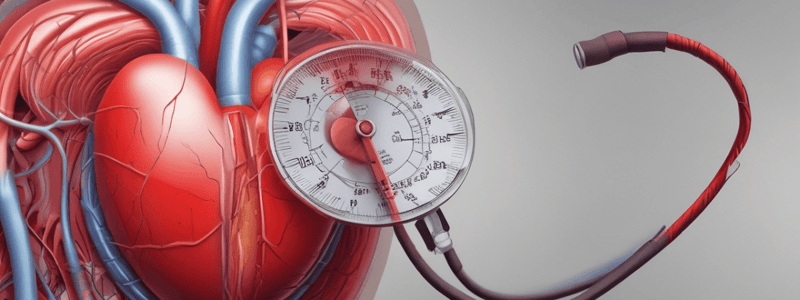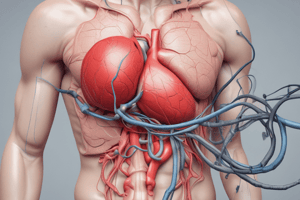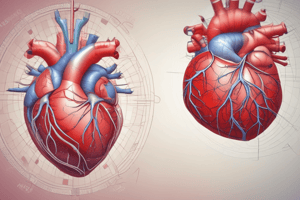Podcast
Questions and Answers
What is the primary function of elastic arteries?
What is the primary function of elastic arteries?
- To increase blood pressure
- To constrict blood vessels
- To distribute blood according to tissue needs
- To smooth out pulse pressure waves (correct)
What is the relationship between pressure and flow in the cardiovascular system?
What is the relationship between pressure and flow in the cardiovascular system?
- Q = ΔP + R
- Q = ΔP x R
- Q = ΔP - R
- Q = ΔP/R (correct)
What is the term used to describe the reduction of pressure pulsations in the arterial system?
What is the term used to describe the reduction of pressure pulsations in the arterial system?
- Propagation of the pressure pulses
- Reflection of the pressure pulses
- Amplification of the pressure pulses
- Damping of the pressure pulses (correct)
What is the term used to describe the total opposition to blood flow in the systemic circulation?
What is the term used to describe the total opposition to blood flow in the systemic circulation?
What is the equation for calculating total peripheral resistance?
What is the equation for calculating total peripheral resistance?
What is the effect of an increase in mean arterial pressure on total peripheral resistance?
What is the effect of an increase in mean arterial pressure on total peripheral resistance?
What is the approximate pressure in the vena cava and right atrium?
What is the approximate pressure in the vena cava and right atrium?
What is the primary driving force behind blood flow in the cardiovascular system?
What is the primary driving force behind blood flow in the cardiovascular system?
What is the term for the amplitude of pressure pulsations in an artery?
What is the term for the amplitude of pressure pulsations in an artery?
What is the primary factor that affects blood viscosity?
What is the primary factor that affects blood viscosity?
What is the term used to describe the measurement of the pulse pressure wave in the femoral artery?
What is the term used to describe the measurement of the pulse pressure wave in the femoral artery?
What is the highest arterial pressure measured during a cardiac cycle?
What is the highest arterial pressure measured during a cardiac cycle?
What is the lowest arterial pressure measured during a cardiac cycle?
What is the lowest arterial pressure measured during a cardiac cycle?
What is the formula to calculate pulse pressure?
What is the formula to calculate pulse pressure?
What is the significance of pulse pressure in relation to stroke volume?
What is the significance of pulse pressure in relation to stroke volume?
What is the formula to calculate mean arterial pressure?
What is the formula to calculate mean arterial pressure?
Why is mean arterial pressure more significant than other pressures in the cardiovascular system?
Why is mean arterial pressure more significant than other pressures in the cardiovascular system?
What determines arterial pressure when arterial compliance is constant?
What determines arterial pressure when arterial compliance is constant?
What is the main factor that regulates the central venous pressure?
What is the main factor that regulates the central venous pressure?
What is the relationship between pulmonary vascular resistance and systemic vascular resistance?
What is the relationship between pulmonary vascular resistance and systemic vascular resistance?
What happens to the right atrium pressure when the right heart is pumping strongly?
What happens to the right atrium pressure when the right heart is pumping strongly?
What is the formula to calculate pulmonary vascular resistance (PVR)?
What is the formula to calculate pulmonary vascular resistance (PVR)?
What is the purpose of ventilation-perfusion matching in the pulmonary circulation?
What is the purpose of ventilation-perfusion matching in the pulmonary circulation?
What is the effect of dilating arterioles on peripheral venous pressure?
What is the effect of dilating arterioles on peripheral venous pressure?
What is the relationship between mean arterial pressure and cardiac output?
What is the relationship between mean arterial pressure and cardiac output?
What happens to the right atrium pressure when there is weakness of the heart?
What happens to the right atrium pressure when there is weakness of the heart?
What is the term for the pressure in the vena cava and right atrium?
What is the term for the pressure in the vena cava and right atrium?
Which part of the nervous system is responsible for causing vasoconstriction in arterioles and venules?
Which part of the nervous system is responsible for causing vasoconstriction in arterioles and venules?
What is the effect of the cardiac accelerator center on the heart?
What is the effect of the cardiac accelerator center on the heart?
Which receptors are involved in the cardiac decelerator center?
Which receptors are involved in the cardiac decelerator center?
What is the strongest stimulus for baroreceptors?
What is the strongest stimulus for baroreceptors?
Where do the efferent neurons from the vasopressor center synapse?
Where do the efferent neurons from the vasopressor center synapse?
What is the effect of an increase in parasympathetic activity on the SA node?
What is the effect of an increase in parasympathetic activity on the SA node?
Where do the afferent nerves from the baroreceptors synapse?
Where do the afferent nerves from the baroreceptors synapse?
What is the response to an increase in MAP detected by baroreceptors?
What is the response to an increase in MAP detected by baroreceptors?
Which part of the nervous system is involved in the cardiac decelerator center?
Which part of the nervous system is involved in the cardiac decelerator center?
What is the effect of a decrease in sympathetic activity on the SA node?
What is the effect of a decrease in sympathetic activity on the SA node?
What is the effect of a decrease in sympathetic activity on arterioles?
What is the effect of a decrease in sympathetic activity on arterioles?
What is the overall effect of the baroreceptor reflex on mean arterial pressure during hemorrhage?
What is the overall effect of the baroreceptor reflex on mean arterial pressure during hemorrhage?
What happens to the sensitivity of baroreceptors in chronic hypertension?
What happens to the sensitivity of baroreceptors in chronic hypertension?
What is the consequence of receptor accommodation in chronic hypertension?
What is the consequence of receptor accommodation in chronic hypertension?
What is the formula for calculating mean arterial pressure?
What is the formula for calculating mean arterial pressure?
What is the effect of a decrease in cardiac output on mean arterial pressure?
What is the effect of a decrease in cardiac output on mean arterial pressure?
What is the effect of a decrease in total peripheral resistance on mean arterial pressure?
What is the effect of a decrease in total peripheral resistance on mean arterial pressure?
What is the consequence of receptor accommodation on the baroreceptor reflex?
What is the consequence of receptor accommodation on the baroreceptor reflex?
What are the 3 intrinsic factors for blood flow?
What are the 3 intrinsic factors for blood flow?
Epinephrine is the most important vasodilator
Epinephrine is the most important vasodilator
Which of the following is NOT a vasoconstrictor?
Which of the following is NOT a vasoconstrictor?
The pulse pressure is an indicator of stroke volume, because the magnitude of pulse pressure reflects the volume of blood ejected from the left ventricle on a single beat
The pulse pressure is an indicator of stroke volume, because the magnitude of pulse pressure reflects the volume of blood ejected from the left ventricle on a single beat
What is compliance?
What is compliance?
The pressure pulses waves travel from high resistance to high compliance arteries
The pressure pulses waves travel from high resistance to high compliance arteries
The MAP is regulated by what two things?
The MAP is regulated by what two things?
The baroreceptor reflex arc is composed of…
The baroreceptor reflex arc is composed of…
What other organs/places does angiotensin II act on? (Hint: 5)
What other organs/places does angiotensin II act on? (Hint: 5)
What zone of the adrenal gland does angiotensin II act on?
What zone of the adrenal gland does angiotensin II act on?
Which mineralocorticoid is released from the Zona glomerulosa?
Which mineralocorticoid is released from the Zona glomerulosa?
Aldosterone helps with increase of ________ absorption and excretion of potassium
Aldosterone helps with increase of ________ absorption and excretion of potassium
Angiotensin II is able to act on the “thirst center” to increase thirst and water intake. What is this thirst center?
Angiotensin II is able to act on the “thirst center” to increase thirst and water intake. What is this thirst center?
ADH causes vasodilation
ADH causes vasodilation
What are the four other mechanisms that assist in regulating MAP?
What are the four other mechanisms that assist in regulating MAP?
What specific receptors in the veins, atria and pulmonary arteries sense changes in blood volume?
What specific receptors in the veins, atria and pulmonary arteries sense changes in blood volume?
What peptide is released from the heart in response to blood volume increase ?
What peptide is released from the heart in response to blood volume increase ?
What organs does ANP act on that bring the blood volume back to normal?
What organs does ANP act on that bring the blood volume back to normal?
Study Notes
Pressures in the Cardiovascular System
- Blood pressure is not equal throughout the cardiovascular system; a pressure difference is necessary to drive blood flow.
- With each heartbeat, a new surge of blood fills the arteries, causing pressure to increase.
- The amplitude of pressure pulsations in an artery is called pulse pressure.
Systolic and Diastolic Pressure
- Systolic pressure is the highest arterial pressure measured during a cardiac cycle, occurring when blood is ejected from the left ventricle.
- Diastolic pressure is the lowest arterial pressure measured during a cardiac cycle, occurring during ventricular relaxation when no blood is being ejected from the left ventricle.
Pulse Pressure
- Pulse pressure is the difference between systolic and diastolic pressure, reflecting the volume of blood ejected from the left ventricle on a single beat.
- Pulse pressure is an indicator of stroke volume.
Mean Arterial Pressure (MAP)
- MAP is the average pressure in a complete cardiac cycle, calculated as diastolic pressure + 1/3 pulse pressure.
- MAP is the most significant pressure that drives blood into tissues over the course of the cardiac cycle and is monitored and regulated by blood pressure reflexes.
Arterial Compliance and Resistance
- Elastic arteries (e.g., aorta and carotid artery) have high compliance and are involved in pulse-smoothing.
- Muscular arteries (e.g., femoral and mesenteric arteries) have high resistance and are capable of vasoconstriction and dilation to distribute blood according to tissue needs.
Pulmonary Circulation
- Pulmonary circulation is a low-pressure circulation with lower vascular resistance compared to systemic circulation.
- Pulmonary blood vessels are compliant and readily distend to accept increased blood flow.
Venous Pressures
- Venous pressures are much lower than arterial pressures, decreasing to near zero in the vena cava and right atrium.
- Central venous pressure (CVP) is regulated by the ability of the heart to pump blood out of the right atrium and ventricle into the lungs and by venous return from the peripheral veins.
Regulation of Mean Arterial Pressure
- MAP is regulated by the vasomotor center, cardiac accelerator center, and cardiac decelerator center.
- The baroreceptor reflex plays a key role in regulating MAP in response to changes in blood pressure.
Baroreceptor Reflex
- The baroreceptor reflex is a rapid response to changes in MAP, involving the detection of pressure changes by baroreceptors, transmission of information to the medulla, and coordinated responses from the medullary cardiovascular centers.
- The reflex responds to changes in MAP by altering heart rate, cardiac contractility, and peripheral resistance to maintain homeostasis.
Studying That Suits You
Use AI to generate personalized quizzes and flashcards to suit your learning preferences.
Related Documents
Description
This quiz covers the topic of blood pressure in the context of cardiovascular physiology, including pressures in the cardiovascular system and related concepts.




